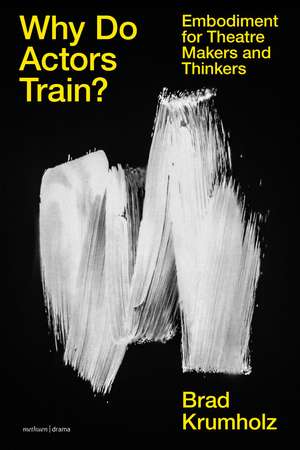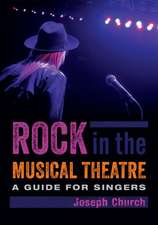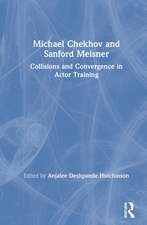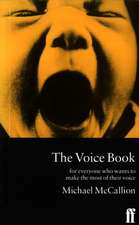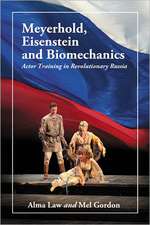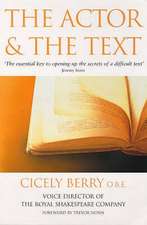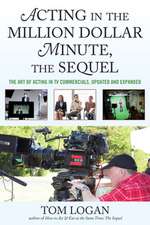Why Do Actors Train?: Embodiment for Theatre Makers and Thinkers
Autor Brad Krumholzen Limba Engleză Hardback – 22 feb 2023
| Toate formatele și edițiile | Preț | Express |
|---|---|---|
| Paperback (1) | 190.87 lei 3-5 săpt. | |
| Bloomsbury Publishing – 21 aug 2024 | 190.87 lei 3-5 săpt. | |
| Hardback (1) | 467.40 lei 6-8 săpt. | |
| Bloomsbury Publishing – 22 feb 2023 | 467.40 lei 6-8 săpt. |
Preț: 467.40 lei
Preț vechi: 646.24 lei
-28% Nou
Puncte Express: 701
Preț estimativ în valută:
89.45€ • 93.04$ • 73.84£
89.45€ • 93.04$ • 73.84£
Carte tipărită la comandă
Livrare economică 14-28 aprilie
Preluare comenzi: 021 569.72.76
Specificații
ISBN-13: 9781350236967
ISBN-10: 1350236969
Pagini: 224
Dimensiuni: 156 x 234 x 22 mm
Greutate: 0.49 kg
Editura: Bloomsbury Publishing
Colecția Methuen Drama
Locul publicării:London, United Kingdom
ISBN-10: 1350236969
Pagini: 224
Dimensiuni: 156 x 234 x 22 mm
Greutate: 0.49 kg
Editura: Bloomsbury Publishing
Colecția Methuen Drama
Locul publicării:London, United Kingdom
Caracteristici
Analyses the actor's craft in ways that are not conceptually limited by implicitly dualistic formulations, making use of discoveries and assertions from the social sciences to do so
Notă biografică
Brad Krumholz is Assistant Professor and Head of Production for the Theatre Department at Hunter College, NY, USA. He is also Executive Artistic Director and Co-Founder of North American Cultural Laboratory (www.NACL.org). His recent publications include "The Problem of Movement Theatre" in Movement for Actors (Methuen Drama, 2013) and "Locating the Ensemble: NACL Theatre and the Ethics of Collaboration" in Encountering Ensemble (Methuen Drama, 2013).
Cuprins
Overviewi.What A Body Can Be - Defining Our Subjectii.The Trouble with Mind/Body Dualismiii.Embodied Cognition Definediv.Performance Philosophy - Contours of The Fieldv.Acting and Techniquevi.Performance Styles Consideredvii.Making Meaning through Actingviii.My Methodologyix.Structure of This BookPart One: Action in Theory and Practicei.Introductionii.Training Exercises and The Plastiquesiii.Approaching Action through Wittgensteina.What Is Intention?iv.Principles of Scenic Behaviora.Mark Johnson and Image Schemas v.Maxine Sheets-Johnstone and Animate Formsvi.Where Is Meaning Located?vii.The Importance of Interactionviii.Concluding ThoughtsPart Two: Encountering Perception and Proprioception in The Actor's Crafti.Introduction ii.The 3 Layers of Actor Trainingiii.Alva Noë and The Enactive Viewiv.The Role of Attentionv.Proprioception: Body Image and Body Schemavi.Dynamic Spacevii.Competency and Presenceviii.Ways of Seeingix.Bodies Working Togetherx.Achieving Fluencyxi.Concluding ThoughtsPart Three: Approaching The Voice beyond The Wordi.Introductionii.The Voice as Actioniii.Theorizing Sound and Voiceiv.Awakening The Resonatorsv.Kreiman and Sidtis: Voice and Voice Qualityvi.The Embodied Voicevii.The Components of Prosodyviii.Listeningix.Gesture and Speech, Connectedx.Simulation and Vocal Productionxi.The Embodied Voice and Socialityxii.Theatre as A Site of Engagementxiii.Concluding ThoughtsAfterthinkingi.Introductionii.An Enactive Theory of Emotioniii.Imagination as An Embodied Processiv.Some Possible Concerns about This Booka.Ethnographic Challengesb.Epistemological Uncertaintyc.Other Limitationsv.Escaping The Dualistic Language Trapvi.The Proficiency Model: Real Life Benefits of Actor Trainingvii.Concluding ThoughtsBibliographyIndex
Recenzii
Krumholz has provided both the scholarship and tools for a new insight and understanding of the art of theatre and specifically the craft of acting that is essential in delivering the art. Theatre professionals, educators, students and historians will find this a revelatory and engaging exploration.
How do the actions of everyday life change when they're performed under the eyes of an audience? Drawing on the growing field of embodied cognition and his own extensive experience in acting, directing, and actor training, Brad Krumholz answers this question with a rich account of acting-and actor training-as dynamic, relational, sensorimotor processes. Bristling with insights, this book is essential reading for anyone interested in why actors train and what this training accomplishes.
Why Do Actors Train is a vitally important book for actors, students, scholars, and instructors who wish to better understand embodied cognition in actor training and how they might utilize it within their own practice.
Some books might tell you that the body is important without going much beyond this slogan. This book tells you why! A sharp and careful analysis of the many ways theatre practice might be said to be embodied. Brad Krumholz expertly engages in some of the most recent contemporary philosophical theories and opens up a way for theatre scholars and practitioners to think differently.
A thorough and thoughtful book full of astonishing ideas and intriguing proposals!
Why Do Actors Train? is a thoroughly considered analysis of what is happening at the site of performance. I felt invited to encounter myself as a performer and a human being through a different lens, thus reconsidering myself onstage and off.
How do the actions of everyday life change when they're performed under the eyes of an audience? Drawing on the growing field of embodied cognition and his own extensive experience in acting, directing, and actor training, Brad Krumholz answers this question with a rich account of acting-and actor training-as dynamic, relational, sensorimotor processes. Bristling with insights, this book is essential reading for anyone interested in why actors train and what this training accomplishes.
Why Do Actors Train is a vitally important book for actors, students, scholars, and instructors who wish to better understand embodied cognition in actor training and how they might utilize it within their own practice.
Some books might tell you that the body is important without going much beyond this slogan. This book tells you why! A sharp and careful analysis of the many ways theatre practice might be said to be embodied. Brad Krumholz expertly engages in some of the most recent contemporary philosophical theories and opens up a way for theatre scholars and practitioners to think differently.
A thorough and thoughtful book full of astonishing ideas and intriguing proposals!
Why Do Actors Train? is a thoroughly considered analysis of what is happening at the site of performance. I felt invited to encounter myself as a performer and a human being through a different lens, thus reconsidering myself onstage and off.
